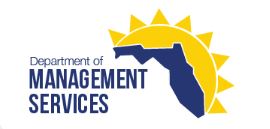Florida SLERS extension with L3Harris may be delayed until spring, state official says
Florida public-safety entities may not know the terms of a contract extension with L3Harris to continue operation of the Statewide Law Enforcement Radio System (SLERS) until next spring, an official with the Florida Department of Management Services (DMS) said today.
Patrick Gillespie, DMS deputy secretary of business operations told board members of the Florida Joint Task Force (JTF)—the state entity that provides advice about SLERS—that DMS officials have been meeting with L3Harris representatives regularly, but an extension deal likely will not be reached until after the state legislature begins its session on March 2. A SLERS extension is needed by the end of June, which is when the current SLERS contract with L3Harris expires.
“We’re continuing to have conversations with L3Harris,” Gillespie said during the JTF meeting this morning. “We’re meeting every other week and continuing to talk through a couple of different scenarios related to continuing operations of the system moving forward. I do think these will be conversations that continue into [the Florida Legislature] session, just given the uncertainty of the budget.
“I think that’s something that we’re going to continue working on with the Legislature moving forward. I think we’re going to continue having these discussions and continue looking at different scenarios for the next several months.”
Gillespie did not provide any details about the budget “uncertainty,” but the Florida economy—particularly the portion dependent upon the tourism industry—has been impacted negatively by the COVID-19 pandemic. Florida reportedly could be facing a $2 billion budget shortfall next year, depending on its access to federal funding.
Col. Gene Spaulding, chairman of the Florida Joint Task Force board and director of the Florida Highway Patrol (FHP), noted that DMS is “in a tight spot” and has been working “diligently” to negotiate an extension with L3Harris. But Spaulding also stressed that getting a deal done in a timely matter is important as public-safety entities formulate legislative budget requests [LBRs] to fund the replacement of aging EDACS radios.
“I just want to go back on record and reiterate how big of a concern this is for the agencies,” Spaulding said during the JTF meeting. “This is a law-enforcement and citizen-safety issue—having effective communications—and the timelines are running really, really short.
“I think we’re in a position that nobody anticipated. It’s really nobody’s fault. But we are here, and … [state lawmakers need to know] how critical these LBRs are, going for new radios for the agencies.”
Speaking on behalf of the Florida Highway Patrol, Spaulding said that the tight timelines associated with SLERS mean that the organization has less flexibility than it might have otherwise.
“Our LBR was very bare bones,” Spaulding said. “It got the basics in, and really, there’s no room for piecemealing or trying to put together different options. And even if an extension is awarded to L3Harris, I think there are still some issues with end-of-life radios.
“We have got to stand together as agencies and with DMS to go forward and pursue this collectively and make sure that our voices are heard at the Legislature and the governor’s office.”
Spaulding also noted that the $3 surcharge attached to legal citations—a significant component to the funding of SLERS—is scheduled to sunset, so agencies should urge state lawmakers to renew the revenue source.
“When you’re dealing with your legislators and out supporting your LBRs, … please put that on their radar, as well,” Spaulding said. “I think that’s a critical issue that could negatively impact [SLERS], if it doesn’t get renewed.”
Extending the SLERS contract with L3Harris is necessary because the state was unable to reach an agreement with Motorola Solutions—the winner of lengthy procurement—to build a new statewide LMR network that would upgrade the technology from EDACS to P25 Phase II.
In January, DMS announced that it ended talks with Motorola Solutions after the LMR giant declined to sign a contract based on the terms of its bid, according to a state official. At the time, Florida DMS Secretary Jonathan Satter wrote in a letter to Motorola Solutions that Florida DMS would “move toward the new procurement of a next-generation system”—language reiterated in today’s statement from DMS.
A $2.4 million item in the Florida state budget provides some guidance about the state’s current vision for SLERS II.
“[DMS] must release a competitive procurement and, thereafter, issue an award for the replacement of the Statewide Law Enforcement Radio System,” according to the budget item. “At a minimum, future services must utilize the industry-standard Project 25 Phase II delivery methodology. The procurement must also consider emerging technologies to enhance interoperability, promote public safety, improve coverage and enhance audio clarity.”
Consulting firm Federal Engineering was expected to deliver a business case for the second SLERS II procurement by the end of October, but the document was not ready to be presented during today’s JTF meeting.
“We’re still working through our business case, kind of making last-minute tweaks to it,” Gillespie said. “That should be wrapped up very shortly, and we’ll be able to share that with the members once that’s finalized.”
















